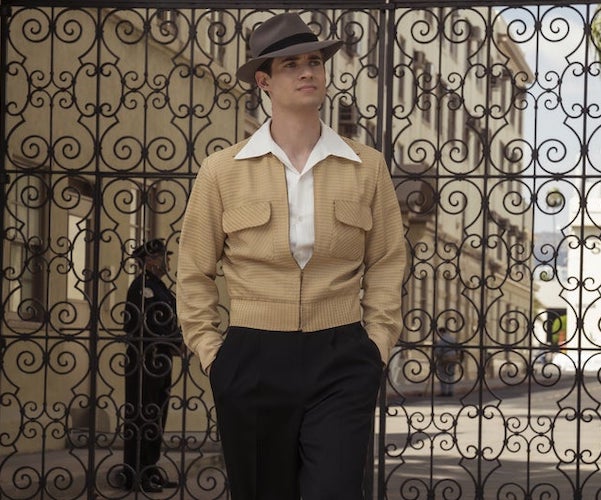Television Review: “Hollywood’ — A Satisfying Tinsel Town Fantasy
By Sarah Osman
Maybe being quarantined for so long has taken its toll, but Hollywood satisfies well enough as a vibrant escape to glamorous parties filled with scheming executives and hot-to-trot actors on the make.

David Corenswet plays Jack, an aspiring actor turned gigolo. Photo: Netflix.
An intimate look at the drag ball scene of the ’80s, Pose arguably remains show runner Ryan Murphy’s best drama, partly because of its mix of historical accuracy, diverse casting, and characters who one can’t help but care about. The series managed to elude many of Murphy’s traps — a weakness for wallowing in the stylized and confusing plotlines. The drama stands as a valuable testament to just how diverse Hollywood has become.
Murphy’s latest drama, Hollywood, isn’t quite as strong as Pose, though it is more effective than some of his more recent efforts (Netflix’s The Politician comes to mind). Set in a slightly alternate version of ’40s Hollywood, this seven-part miniseries is at times historically accurate. On other occasions, it strives to be a divine fantasy of what could have been, a campy speculation on how the history of film would have been different if studio executives hadn’t been afraid of taking political/aesthetic risks.
The series opens with Jack Castello (David Corenswet), a young Army vet who is desperate to be in “the pictures.” He’s frantic to the point that he masquerades as a gas station attendant/gigolo, wining and dining (and a few other “-ings”) the lonely women of Hollywood. (The character is based on a real life figure, Scotty Bowers, the subject of the excellent 2018 documentary Scotty and the Secret History of Hollywood.) He’s not the only one who will do just about anything to break into the biz. His black gay co-worker, Archie (Jeremy Pope), has written a screenplay (which becomes a focal point in the series) and is romancing a young Rock Hudson (Jake Picking). Meanwhile, on the studio side (he later intertwines with the other characters), we meet Raymond (Darren Criss) a half-Filipino director who is coming to terms with his own ethnicity while dating Camille (Laura Harrier), a black starlet who is trying not to be cast in stereotypical roles. The drama draws these characters together: they fight and claw their way to the top, at the same time trying to add a bit more diversity to a world that is as white as a Doris Day picture.
The acting is adequate. Jim Parsons steals the show as Hudson’s menacing gay manager. One can’t help but shudder every time he is on screen: the guy literally terrifies Hudson into becoming a star. It’s debatable how “real” Parsons’s character may be. But considering all the #metoo stories that have come out of Hollywood, including confessions from bedeviled actors, he may not be out-of-bounds. Parsons is best known as the nerdy Sheldon on The Big Bang Theory, so this performance comes as a shock: it proves that he is an amazingly versatile actor.
Stylistically, Murphy (and co-creator Ian Brennan) pull audiences into a dreamily fashionable world of ’40s Hollywood, serving up big band musical interludes, stunning costumes, and women in gorgeous makeup. Disappointingly, Hollywood’s dialogue feels a bit more 2020 than 1948 given that characters curse openly as they discuss topics that probably wouldn’t have been talked about so publicly over 70 years ago.
What’s alarming about Hollywood’s conflicts regarding gender, identity, and class is how pressing they remain today. Yes, television is slowly becoming more diverse, but films are not making as much progress — it’s disappointing to see how little has changed. As in 1948, people of color are rarely cast as protagonists, with women still struggling to appear in roles beyond the obligatory “love interest.”
Maybe being quarantined for so long has taken its toll, but Hollywood satisfies well enough as a vibrant escape to glamorous parties filled with scheming executives and hot-to-trot actors on the make. The drama is not nearly as poignant as Pose, but it’s a way to dream about a better, more accepting world. And that is a mighty pleasing contrast to where we are at the moment.
Sarah Mina Osman is a writer living in Los Angeles. She has written for Young Hollywood and High Voltage Magazine. She will be featured in the upcoming anthology Fury: Women’s Lived Experiences under the Trump Era
